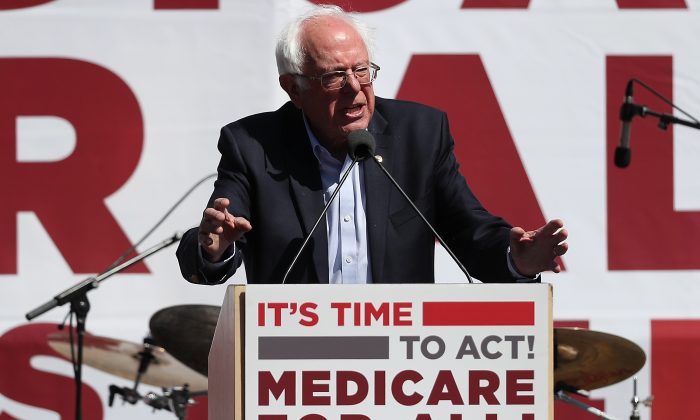By Venus Upadhayaya, Epoch Times
While the 2020 Democratic presidential debates are mostly dominated by Medicare for All, some health care industry professionals are saying any such approach will cause families to pay more and wait longer for worse healthcare.
“Whether it’s called Medicare for All, Medicare buy-in, Medicare for all who want it, or the public option, a new government health insurance system will force Americans to pay more and wait longer for lower-quality care,” Lauren Crawford Shaver, executive director of the Partnership for America’s Health Care Future told The Epoch Times in a statement.
Medicare for All is legislation proposed mostly by Democratic presidential candidates that would fundamentally reshape the U.S. healthcare system to extend Medicare to all Americans.
Partnership for America’s Health Care (PAHCF) is a group comprising insurance companies, hospitals, and major drugmakers whose aim is “to work together to lower costs, protect patient choice, expand access, improve quality, and foster innovation,” according to its website.
A Rise in Taxes for the Middle Class
Experts and industry lobbying against Medicare for All and its variants say that it’ll substantially increase the taxes Americans have to pay—not only for the wealthy and corporations, but the middle class as well.
The Medicare for All plan from Sen. Elizabeth Warren (D-Mass.) and Sen. Bernie Sanders (I-Vt.), who is also the author of the bill, would put an end to most private insurance and replace it with mandatory federal government healthcare.
Describing Medicare for All as a “human right” Sanders said on his website that it is a “single-payer, national health insurance program to provide everyone in America with comprehensive health care coverage, free at the point of service.”
“No networks, no premiums, no deductibles, no copays, no surprise bills.”
Former Vice President Joe Biden and former New York City Mayor Mike Bloomberg are also supportive of for Medicare for All but are allowing people to retain their private health care plans.
On his website, Biden says that he will build on Obamacare, or the “Affordable Care Act,” with a plan to insure more than an estimated 97 percent of Americans by the means of three provisions that include “giving Americans a new choice, a public health insurance option like Medicare.”
Bloomberg mentions that he believes “every American should have access to affordable medical care, and expanding Obamacare and Medicare is the best way to achieve universal coverage.”
According to the Committee for Responsible Federal Budget (CRFB), any such Medicare for All plan “is likely to cost the federal government $28 trillion to $32 trillion more than it would spend under current law over the next decade.”
Shaver said that in any case, it would double the taxes Americans would have to pay.
“Economists across the political spectrum warn that Medicare for All would increase federal health care spending by $32 trillion over a decade, an unaffordable cost that independent analysts predict would require doubling the income taxes Americans pay,” said Shaver.
Alan Sager, an expert on health law, policy, and management told The Epoch Times that Sanders’s and Warren’s Medicare for All and Biden’s and Bloomberg’s Medicare for all who want it “each will require substantial rises in taxes.”
“Newly covered people will have to be subsidized and people switching the source of payment from a mix of OOPs (out of pocket) and private insurance to taxes will have to be covered by new taxes (to replace OOPs) and clawback taxes (to replace private insurance).”
The CRFB said that no Democratic presidential candidate has fully specified how they would pay for the entire cost of Medicare for All, but its analysis says that “fully offsetting the cost” would mean more taxes on the middle class (earning between $25,000 to $200,000).
The CRFB explained that the Medicare for All plans will not be able to raise the entire budget from the tax hike “even with extremely aggressive revenue-raising policy changes” for wealthy and corporations, and the tax hike would have to include the middle class.
“It is unlikely that policymakers could agree to enact anywhere close to $11 trillion in tax increases only on the wealthy and corporations, let alone the $30 trillion needed to fund Medicare for All.
“As a result, funding Medicare for All will almost certainly require broad-based taxes that apply to the middle class, either directly or indirectly (for example through an employer payroll tax or consumption tax),” said the CRFB.
Impact on the Quality of Health Care
Some experts say that Medicare for All would be able to provide universal health care to everyone but it doesn’t come without other challenges and drawbacks. There are others who say it’ll adversely impact the quality of health care.
Sager who is also a co-director of the Health Reform Program at Boston University School of Public Health, said that the single-payer system will be able to cover everyone “if the new Congressional/trust fund entity negotiates affordable payment rates with hospitals, doctors, and the rest of the caregivers. These negotiations will have political, financial, legal, ethical, and clinical components.”
Sager wondered if the proponents of the single-payer system will have the “political motivation and the clout” to negotiate “intelligently and effectively” with care providers.
“Will caregivers be sufficiently far-sighted to compromise with the new paying entity? Will they recognize that more money for the business, as usual, is doomed and that the sooner they compromise, the better the deal they’ll get?” Sager said.
Sager said the single-payer system will be able to cover everybody recognized by the law but long term care and mental health and substance abuse will be challenging. “Special remedies will have to be crafted here, remedies that go way beyond public financing,” he said.
The non-partisan Congressional Budget Office (CBO) warned that a single-payer policy would pose both opportunities and risks for the health care system. It said the single-payer system would reduce administrative costs and will have greater incentives to invest in improving people’s health care, but it is not known if the single-payer system will act on that incentive.
“An expansion of insurance coverage under a single-payer system would increase the demand for care and put pressure on the available supply of care,” said CBO. It said it would take the administration time to implement policies to increase the supply of providers.
“If the number of providers was not sufficient to meet demand, patients might face increased wait times and reduced access to care,” said CBO.
It also said that the public plan will leave people will less choice and might not cater to the needs of certain people as it would provide a “specified set of health care services” only to eligible people.
“For example, under the current system, young and healthy people might prefer not to purchase any coverage, or they might prefer to purchase coverage with high deductibles or fewer benefits. And, unlike a system with competing, private insurers, the public plan might not be as quick to meet patients’ needs, such as covering new treatments,” said CBO.
Sager said that executing Medicare for All plans doesn’t ensure a patient-centric health care system.
According to Sager, patient-centeredness depends upon rebuilding primary care (PC). “PC means a doctor (or nurse practitioner/physician assistant) who knows you, and who you trust. PC is the sun whose gravitational pull holds the planets of specialization, ERs, meds, and inpatient care in their orbits. PC coordinates, ensures continuity, offers first-contact access 168 hours/week,” he said.
Sager explained that health care is “accessible, affordable, and secure” only when it’s built by a combination of “personal trust and professional competence.”
“It will take a decade or two, at minimum, to rebuild PC and attract the smartest and kindest doctors to it,” he said.
‘Improving Upon What Works in Health Care’
Health care industry professionals say that instead of coming up with a new universal health care plan that the Democratic presidential candidates are campaigning for and that would completely reshape the U.S. health care system, it would be better to improve upon what’s already existing and fix what needs to be fixed.
“With about 90 percent of Americans covered today, we should focus on building and improving upon what works in health care, while coming together to fix what isn’t,” said Shaver.
He said the lawmakers “fortunately” have all the tools needed to extend health care coverage to millions more and to make it more affordable.
“These include expanding Medicaid in the states that have not yet expanded the program, which would immediately extend coverage to millions, as well as strengthening available subsidies so Americans of all income levels can choose coverage that fits their needs, and using reinsurance, which has been proven to stabilize premiums and help control costs for consumers.”
“By taking constructive, common-sense steps such as these, the free market and public programs can continue working together to make health care better and more affordable for every American,” Shaver added.
Sager, on the other hand, believes that the money should be put in the hands of the doctors, and that neither the free-market model nor “traditional government action in health care—beyond spending public money to cover people (via Medicare, Medicaid, other programs)” is fully able to solve the problems of the United States’ current health care system.
“Doctors’ individual decisions to diagnose and treat—patient-by-patient—commit almost 90 cents on the health care dollar. The challenge, therefore, is to put our money in their hands (or under their control) in ways that allow us to trust them to spend our money carefully to take care of all of us,” he said.
Sager believes that doctors and hospitals need to rise above seeking “financial well-being, institutional glory, or stockholders’ returns” and work for the benefit of 330 million Americans.
“Finally, affordable medical security for all really does need to be the goal. Not immortality. It’s good to be ambitious; it’s bad to be unrealistic or arrogant. Medicine has a 100 percent failure rate,” said Sager.






